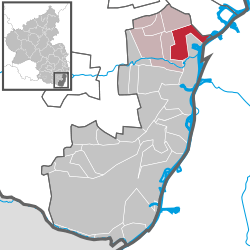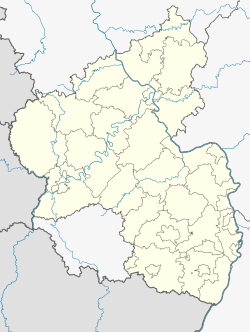Lingenfeld
Lingenfeld is a municipality in the district of Germersheim, in Rhineland-Palatinate, Germany. It is situated approximately 5 km north-west of Germersheim, and 10 km south-west of Speyer.
Lingenfeld | |
|---|---|
 Coat of arms | |
Location of Lingenfeld within Germersheim district  | |
 Lingenfeld  Lingenfeld | |
| Coordinates: 49°14′43″N 8°20′40″E | |
| Country | Germany |
| State | Rhineland-Palatinate |
| District | Germersheim |
| Municipal assoc. | Lingenfeld |
| Government | |
| • Mayor | Markus Kropfreiter (SPD) |
| Area | |
| • Total | 15.33 km2 (5.92 sq mi) |
| Elevation | 104 m (341 ft) |
| Population (2018-12-31)[1] | |
| • Total | 5,788 |
| • Density | 380/km2 (980/sq mi) |
| Time zone | CET/CEST (UTC+1/+2) |
| Postal codes | 67360 |
| Dialling codes | 06344 |
| Vehicle registration | GER |
| Website | www.lingenfeld.de |
Lingenfeld has about 5900 citizens and is continuously growing because of its excellent connections to nearby cities such as Speyer, Mannheim, Ludwigshafen and Karlsruhe via the S-Bahn ("suburban railway").
Lingenfeld is the seat of the Verbandsgemeinde ("collective municipality") Lingenfeld.
Geography
Lingenfeld is located in the Upper Rhine valley in the south of the German wine-growing region Palatinate ("Pfalz") in Rhineland-Palatinate. Close by are the river Rhine in the East of the village and the German Wine Route to the West. Neighbouring places are Römerberg (Pfalz) to the north, Schwegenheim and Westheim (Pfalz) to the west, Germersheim to the south and the frontier to Baden-Württemberg realised through the cut-off meander of the Rhine to the east.
In past centuries the old current of the Rhine caused the loss of about 250 hectares of land due to undermining of the banks.
Lingenfeld lies 104 meters higher than the other communities close to the Rhine, so danger of flooding can be almost entirely excluded.
History
The name Lingenfeld probably comes from settlement "at the long field". It was first mentioned in a document from 1163 as "Lengenveld".
Religions
In 2007 53,3 percent of the inhabitants were Roman Catholic and 22 percent Protestant. The rest belonged to a different religion or was undenominational.
Development of inhabitants
|
|
|
References
- "Bevölkerungsstand 2018 - Gemeindeebene". Statistisches Landesamt Rheinland-Pfalz (in German). 2019.